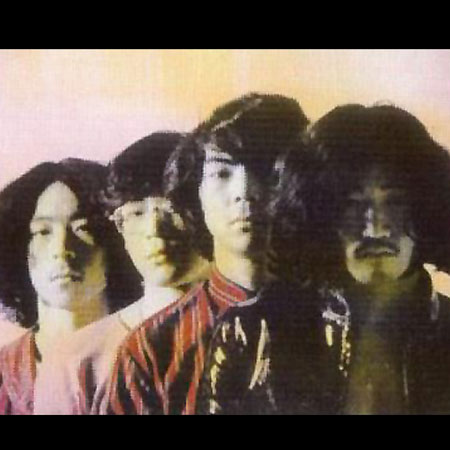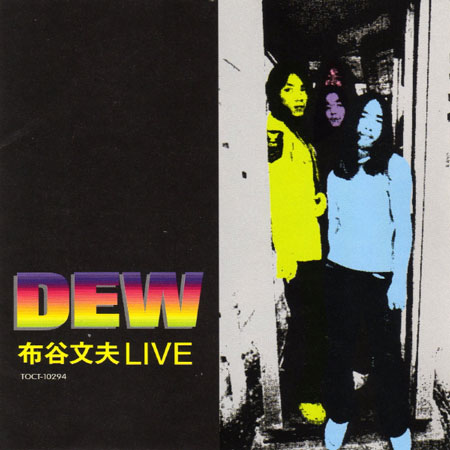
Interpretation by Dan Gear
|
"They had no idea what the hell we were on about! They didn't want to know."
Fumio Nunoya creates his blues. |
||||||
 Japan, the late 60s: Group Sounds, or GS, is in full swing. As Japan's answer to the British Invasion, GS bands took the jangly, light psych/pop sounds emanating from the UK and gave it their own twist. But one GS band had something a little different bubbling under. That band was The Bickies, led by Hokkaido native Fumio Nunoya. While his GS brethren (and they were brethren...there were precious few women in the scene) were trying to cop The Beatles, Nunoya and his cohorts were enthralled with American rock 'n' roll. But not just any kind: they were attracted specifically to black rock 'n' roll, the blues, and soul. Muddy Waters, not the Fab Four, was their spiritual leader. Pursuing their collective muse, three Bickies members formed Blues Creation, one of the first and most influential serious rock bands in Japanese music history. But Nunoya wanted more: he left Blues Creation after their debut album and formed Dew. Dew were spectacular, a brutal, passionate, and downright dirty blues rock band, all topped off with Nunoya's ragged howl. Unfortunately, like so many cutting edge musicians, Nunoya's vision was ahead of its time. The dirty, sweaty blues rock he helped pioneer in his home country didn't rise in popularity until years later, so Dew was never signed. No matter: the group's unshakable leader soldiered on, sticking closely to the blues and southern soul that has meant so much to him for nearly half a century. Now, in 2009, Nunoya is obviously older, but the voice...gruff, undisciplined, and uncompromising...is still there. He's still performing, and recently sat down with Jrawk in a restaurant at Shinjuku station to discuss the blues (of course,) the heart of outsiders, and how sometimes, people just don't get it... JR: Western music is obviously a big influence on any Asian rock scene, but your career specifically focused on American music: the blues, and Southern soul. What was your introduction to American music? FN: I first heard Elvis and Gene Pitney in High School. Good time rock 'n' roll! That's still my biggest influence today. I was still in Hokkaido at the time.
The blues was the music of American blacks, music from a minority that were considered outsiders. My ancestors are Ainu (NOTE: Ainu are an ethnic minority initially based in Hokkaido. Historically, they have often been the target of discrimination within Japanese society.) I'm maybe 10% Japanese, the rest is Ainu. The government finally recognized us as an indigenous tribe only last year! My mother had some Japanese blood, but my father and everyone else... JR: So you relate to the outsider passion in the the blues, and soul. FN: Absolutely. No question. I love black music, roots music. I started with Elvis Presley, but I was more interested in his roots, the origin of what he was doing. JR: When did you start making your own music? FN: My first band was called the Tokyo Rhythm and Blues Five, I was the vocalist. JR: Was this before the Bickies? FN: (nods) The Bickies was with (Blues Creation guitarist) Kazuo Takeda. We still play together occasionally! JR: I haven't been able to find any Bickies stuff, so I don't know what they sound like. Were they R&B? FN: Well, we never recorded, so there's nothing to find! (laughs) We were completely into American music...Japanese music, Group Sounds, didn't interest me, although we were kind of part of that scene. We played a few shows with the 1910 Fruitgum Company. I can't say I was particularly impressed! (laughs) Although they would occasionally cover Hendrix.
August of '68, we decided to become more blues, and that led to Blues Creation. We all lived along the Odakyu line (a train line that runs through Western Tokyo.) We'd play the festival circuit. There were bands like Floral, Apryl Fool...the vocalist of Apryl Fool reminded me of (Procol Harum's) Gary Brooker. Floral played with The Monkees in Tokyo! Apryl Fool were playing music that hadn't really hit Tokyo yet, they were pulling off of bands like Led Zeppelin. It was really something to watch! (imitates Led Zeppelin's "Whole Lotta Love.") JR: Then you debuted with Blues Creation in 1969, but left after the first album. FN: Yeah, that album is all covers...we loved Muddy Waters, John Lee Hooker. We were all young men. I was 21, the other members were as young as 15. We couldn't really play! (laughs) I wanted to do stuff that was more out there. I left and started Dew. JR: There's not so much info on Dew... FN: Well, we had written quite a bit of stuff, but we just didn't take off. The record companies were a bit down on us, and in those days, without a major backing you, there was just no way to get ahead. I had started the band with (Eiryu) Koh-san. Koh-san had been in the Bickies and Blues Creation, it was a bit of a reunion. But he left, and that was it. It didn't last long. After that...I had a wife and child, of course we needed money, so I had a series of part time jobs. Office work, things like that. Now, I'm finally doing music only! JR: What about other projects after Dew? There's your solo album...
FN: The solo album is soul and R&B. I did some stuff that was more psychedelic at times, kind of like Quicksilver Messenger Service, or Big Brother and the Holding Company. None of it went far enough to record, unfortunately. I always returned to R&B, soul. JR: What brings you back? FN: The heart. I feel a connection between soul music and Min'yo, which is a kind of Japanese folk. Southern soul, especially. New Orleans, Memphis. In the 60s and 70s, the new rock coming out of San Francisco and LA appealed to me as well, but now, it's R&B mostly. JR: Was there any real scene around this music in the 60s or 70s? You had bands like The Helpful Soul as well... FN: No. No scene. In the 60s, there was the Group Sounds, and Blues Creation came from that. They had no idea what the hell we were on about! (laughs) The industry people, the managers...they didn't want to know. Group Sounds was selling, the blues wasn't. But the president of Polydor, Sawada-san, he liked us, and he'd had enough of Group Sounds. He had come to some of our live shows, eventually signed us. He took a chance, because people weren't really responding to us. The biggest singer at that time was Julie Sawada (no relation,) more pop and modern rock 'n' roll. People loved him, but when we'd play, they were baffled. But around 1975, interest started growing, but only in bands coming from America...Grand Funk Railroad, bands like that. I loved that stuff, but Japanese artists tended to be ignored in favor of these guys. But honestly, Japanese people don't really understand this music. Their roots are in enka and kayou kyoku, totally different things. Young people these days might understand a little better, but they're just starting. |



